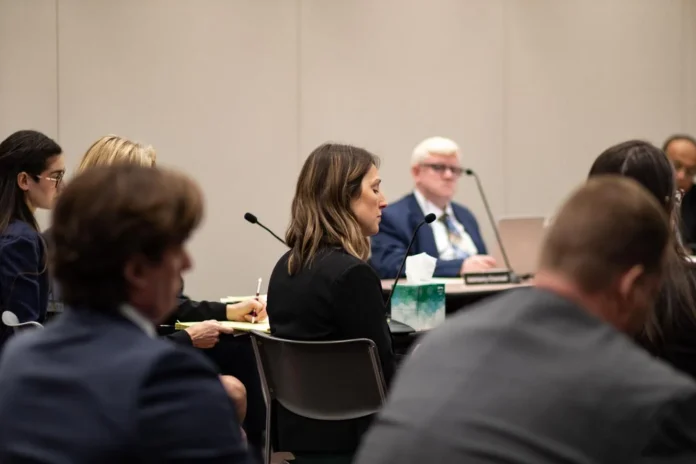Bernard Hearing Outcome Raises Concern For Healthcare Professionals And Media
- By Kyra Howard, TheStatehouseFile.com
- On May 25, Indiana’s medical licensing board found Dr. Caitlin Bernard violated state and federal patient privacy laws when she spoke to a reporter about a 10-year-old Ohio girl who was raped and coming to Indiana in the summer 2022 for an abortion. The hearing began at 9 a.m. and adjourned shortly before midnight.
- Indiana journalists are worried healthcare professionals may now hold back when discussing important medical issues with the public for fear they could be found in violation of federal and state confidentiality laws.
Dr. Caitlin Bernard, the IU Health OB/GYN who came under fire from Indiana Attorney General Todd Rokita, was given a letter of reprimand and fined $3,000 by the Medical Licensing Board of Indiana on May 25. The board found that she violated patient privacy laws by speaking to a newspaper reporter in June 2022 about a 10-year-old pregnant girl who was traveling from Ohio for an abortion.
The Indianapolis Star originally published an article that included Bernard’s account of the 10-year-old girl needing to travel to Indiana for medical care.
The article quickly gained national attention, with some doubting the truth of the story. Eventually, the Indiana Attorney General filed an administrative complaint with the MLB, asserting, in part, that Bernard violated the privacy laws by talking publicly without the patient’s consent. IndyStar reporter Shari Rudavsky was subsequently ensnared in the MLB case and was deposed as to how she found out about the story and what Bernard told her.
Rudavsky’s deposition was played at the MLB hearing last week. In the video she stated her story was meant to focus on women who were having to travel to Indiana for abortion care due to restrictions in their home states.
Brandon Smith, statehouse bureau chief for Indiana Public Broadcasting, said this may cause a ripple effect since journalists will be concerned when talking to doctors and doctors will be more reluctant to talk to journalists.
Smith said that journalists will not refrain from pursuing these stories, but they will face continued challenges when reporting on topics like abortion.
“When you’re doing a story of that nature, when you’re talking about abortion in general, you have to be prepared for a lot of strong feelings in either direction. That’s the reality of the issue, that’s the reality of the climate in this country,” said Smith. “I don’t think the ruling will have any impact on journalists pursuing stories.â€
However, he does think it may cause physicians to be more aware of HIPAA (Health Insurance Portability and Accountability Act) restrictions when speaking of patients. Especially when speaking with reporters.
“But the fact that they said that she did violate these privacy laws, I think, is going to make doctors think twice about talking to journalists,†said Smith.
Smith added the president of the MLB, Dr. Strobel, of Bloomington, seemed to take more issue with the violation because Bernard was talking to a journalist rather than a medical colleague.
“He seemed to indicate that he viewed it as more egregious or at least more troubling, that it was a journalist she was talking to, as opposed to talking to another colleague,†said Smith. “…The fact that it was with a journalist did seem to bother Strobel which again, doctors can see that, hear that and go, ‘Oh, boy. I’m a little worried about that.'”
Smith said the hearing emphasized how to avoid a violation by speaking in hypotheticals or getting patient consent. In Bernard’s case getting consent was not an option as she had not yet been in contact with the patient and speaking in hypotheticals may not have the same impact when the public hears a story.
“We [journalists] don’t prefer hypotheticals if you can give us a real example because that has more impact. At the same time, to be fair though…this was a real example and people still didn’t believe Dr. Bernard and people still didn’t believe Shari,†said Smith. “I guess it doesn’t matter whether it’s hypothetical or real—people are going to believe what they want to believe or disbelieve what they want to disbelieve.â€
Gerry Lanosga, associate professor at Indiana University Media School and a board member for the Indiana Coalition for Open Government, said journalists are at a lesser risk in this situation than healthcare providers due to HIPAA.
“HIPAA has been pretty broadly—and in my view, overly broadly—interpreted and applied by health care providers because of a fear of consequences under that federal legislation,†said Lanosga.
He explained for a HIPAA violation to occur, the disclosure would have to include information that both identifies the patient and the treatment.
“It’s bound to have some effect on physicians and other health care providers, who are going to be much more reluctant to talk to journalists and the public about these things,†said Lanosga. “And, in fact, we’ve seen that that is the history of HIPAA. The law is written the way it is, it’s subject to broad interpretation by people. And they’ve certainly done that.â€
Lanosga pointed out the irony that was highlighted during the MLB hearing. Bernard, he said, was punished for talking “in pretty broad terms†about a case, but the public officials who have also provided details escape any accountability.
Rokita was admonished in December 2022 by Marion County Superior Court Judge Heather Welch for breaking confidentiality laws by revealing before filing the administrative complaint that his office was investigating Bernard. The Indiana Supreme Court Disciplinary Commission is currently reviewing the attorney general’s actions but, to date, has not issued any findings.
“Patient privacy is something we should all be concerned about because every one of us is a patient at some point in our life. I don’t think there is a journalist out there who would argue that patient privacy should not be protected,†said Lanosga. “But in the current political environment, … government entities and some politicians are certainly doing a lot on their own to, sort of, intervene in that doctor-patient relationship in ways that I think are perhaps more of a threat to patient privacy.â€
Steve Key, retired executive director and general counsel for the Hoosier State Press Association, agrees that doctors will err on the side of caution when speaking with journalists.
That makes him worry that physicians will not converse in the public space. They will shy away from providing real-life examples which will limit their ability to humanize health issues for the general public.
“Because this ruling has kind of expanded beyond what the protected parameters are to basically—from my impression—say that, ‘If you give any information that could lead to a person or patient being identified, we’re going to find you in violation, even though you did not give any information away that is protected under HIPAA,’†said Key.
He noted his appreciation of the board for protecting patient privacy, but he does not want this case to set a difficult or confusing precedent for doctors’ understanding of the law.
“It probably will have a chilling effect on their willingness to respond,†said Key about doctors answering questions from the media. “When people are afraid to speak the truth, then it’s harder for the truth to come out. And the public always loses when the truth is hidden.
FOOTNOTE: Â Kyra Howard is a reporter for TheStatehouseFile.com, a news website powered by Franklin College journalism students.Â





